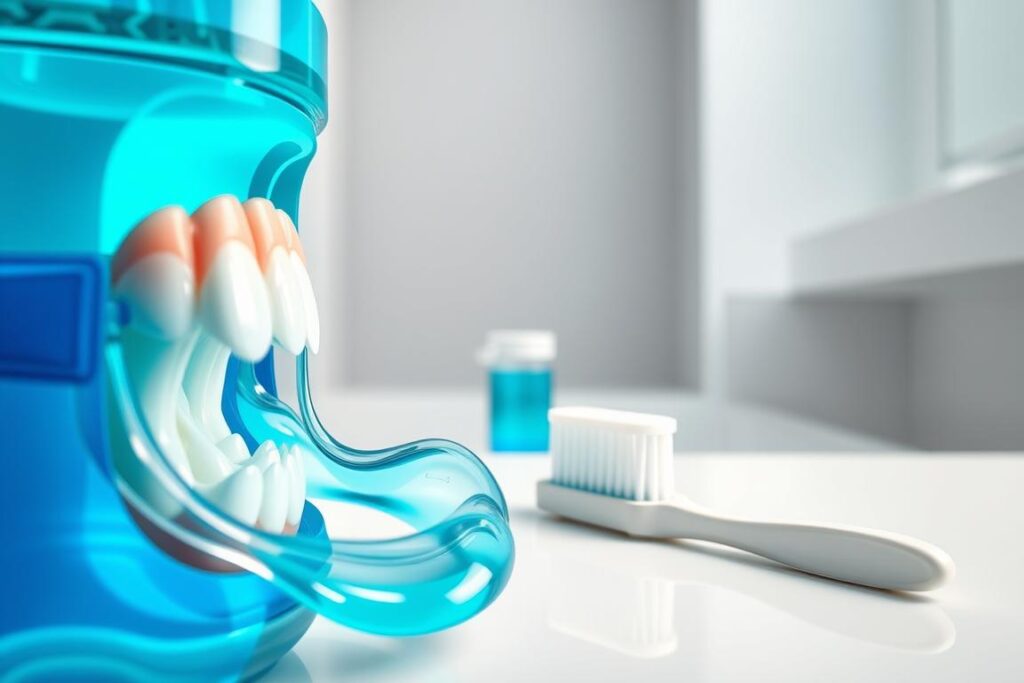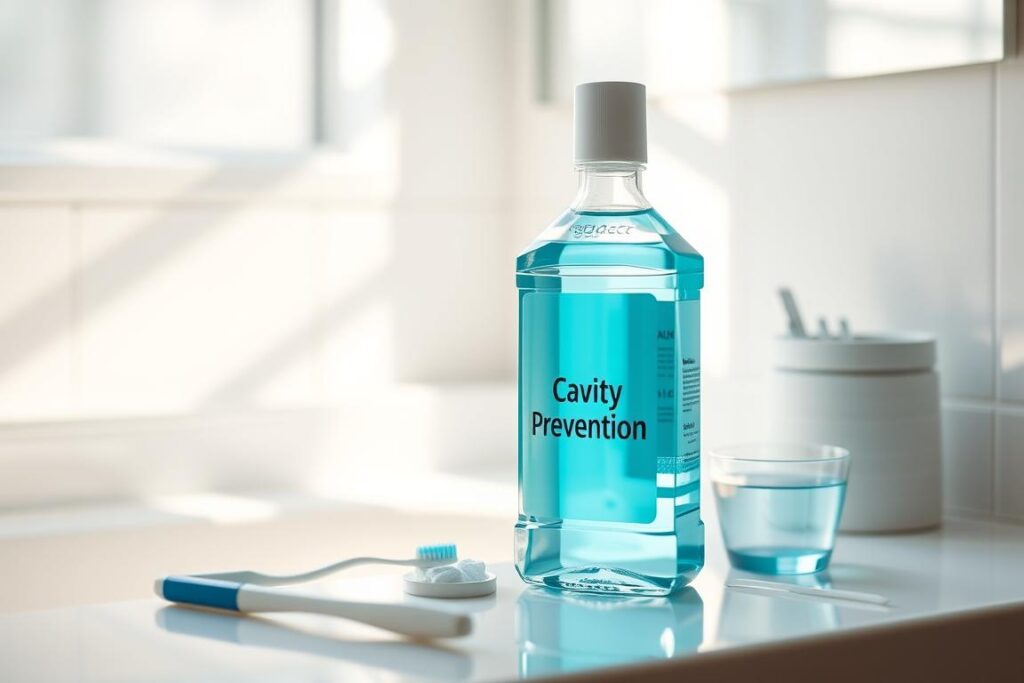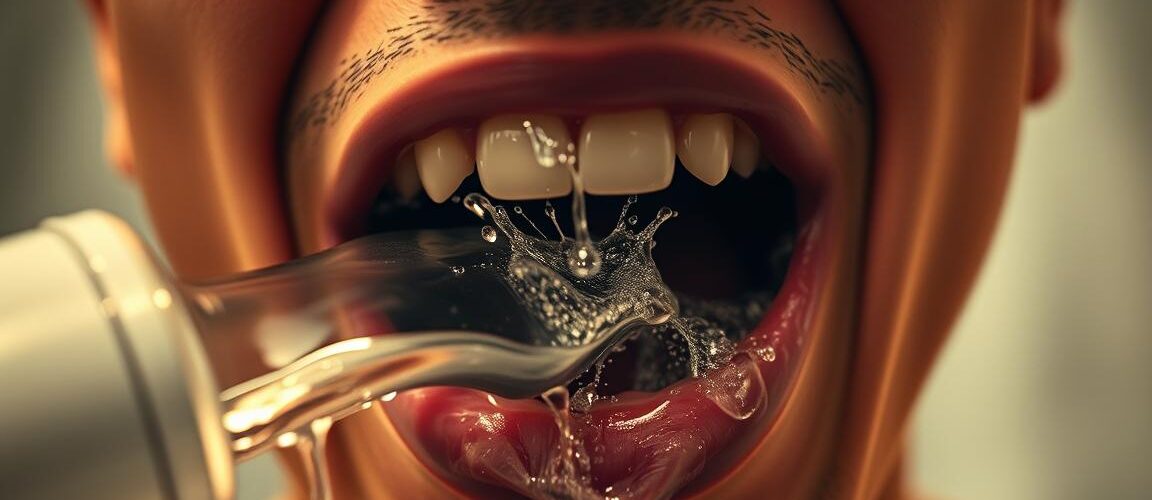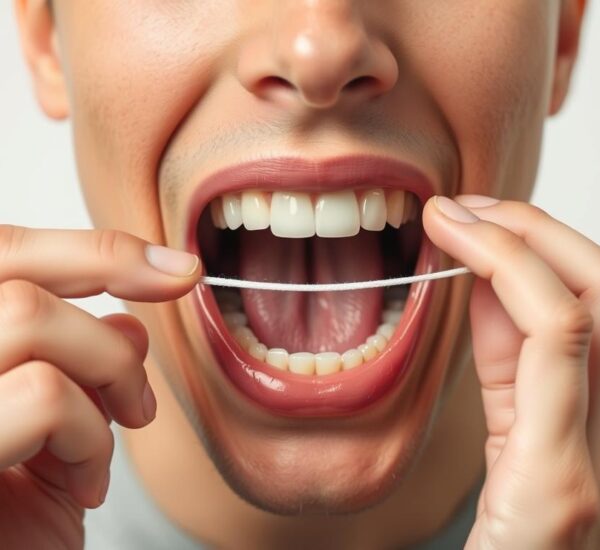We often overlook the importance of using mouthwash in our daily routine. It can greatly improve our oral health when used with brushing and flossing.
Adding antibacterial mouthwash to our routine kills bacteria that cause gum disease and tooth decay. This reduces the risk of these issues. It also removes food particles, fighting bad breath and bacteria that cause plaque and tartar.
Using mouthwash after brushing and flossing makes sure we clean thoroughly. It reaches areas we might miss and adds extra protection for healthier teeth and gums.
Key Takeaways
- Incorporating mouthwash into your daily routine enhances oral hygiene.
- Antibacterial agents in mouthwash help kill bacteria causing gum disease and tooth decay.
- Mouthwash removes lingering food particles, combating bad breath.
- Using mouthwash after brushing and flossing ensures a thorough clean.
- It provides an extra layer of protection for cleaner and healthier teeth and gums.
Understanding What Mouthwash Is
Mouthwash comes in many types, each with its own purpose. It’s a liquid product used to keep your mouth healthy. It helps prevent and treat mouth problems, keeping your teeth and gums in good shape.
Not all mouthwashes are the same. They have different ingredients for different needs. Knowing what you need is key to picking the right one.
The Different Types of Mouthwash
There are many kinds of mouthwash out there. They cater to different needs. Here are a few:
- Antiseptic mouthwashes: These kill bacteria to fight plaque, gingivitis, and bad breath.
- Fluoride mouthwashes: They strengthen tooth enamel to prevent cavities.
- Cosmetic mouthwashes: These freshen your breath and improve taste.
- Prescription mouthwashes: Dentists use these for special conditions or after surgery.
Essential Ingredients in Mouthwash
The ingredients in mouthwash make it work. Here are some common ones:
| Ingredient | Function |
|---|---|
| Water | It’s the main part of mouthwash. |
| Glycerine | It keeps your mouth moist. |
| Sweeteners and flavorings | They make mouthwash taste good. |
| Surfactants | They help mouthwash spread and work better. |
| Antimicrobial agents | They fight off harmful germs. |
| Sodium fluoride | It helps prevent tooth decay by making enamel stronger. |
Knowing about mouthwash types and ingredients helps you choose the right one. This ensures your oral hygiene routine is effective and meets your needs.
Benefits of Using Mouthwash Daily
Adding mouthwash to your daily routine can bring many benefits for a healthier mouth. It’s a great addition to your oral care, working well with brushing and flossing.
Freshening Breath Effectively
Mouthwash is great for keeping your breath fresh. It contains menthol or peppermint oil that makes your mouth feel clean and fresh. Using it after meals or snacks helps remove food particles that cause bad breath.
Reducing Plaque and Gingivitis
Mouthwash also helps fight plaque and gingivitis. Its antibacterial ingredients kill bacteria that cause these problems. Regular use can lead to healthier gums and lower the risk of gum disease.
Knowing the benefits of mouthwash helps you make better choices for your oral health. Adding mouthwash to your daily routine is a simple way to improve your oral health.
How Mouthwash Complements Brushing and Flossing
Mouthwash is key to keeping your mouth healthy. It works well with brushing and flossing. Using mouthwash daily can make your teeth and gums healthier.
The Role of Mouthwash in a Complete Oral Routine
Mouthwash is not a replacement for brushing and flossing. It’s a product that makes your oral care routine better. It reaches spots that brushing and flossing might miss. This helps prevent plaque and gingivitis.
Using mouthwash can help fight plaque and gingivitis. It makes your mouth feel fresher and your gums healthier. This is because mouthwash adds to your overall oral care.
| Oral Hygiene Practice | Primary Function | Additional Benefits |
|---|---|---|
| Brushing | Removes plaque and food particles | Helps prevent tooth decay and gum disease |
| Flossing | Removes plaque and debris between teeth | Prevents gingivitis and gum damage |
| Mouthwash | Kills bacteria and freshens breath | Provides additional plaque prevention and gingivitis reduction |
Timing Your Mouthwash Use for Maximum Effect
When you use mouthwash is important. It helps prevent plaque, reduces gingivitis, and keeps your breath fresh. It’s best to use mouthwash after brushing and flossing.
Using mouthwash after meals or before bed can also be beneficial, depending on your oral health needs. By using mouthwash at the right time, you get the most out of your oral care routine.

Mouthwash for Specific Needs
Mouthwash comes in many types to meet different oral health needs. It’s important to pick the right one for your needs. This can really improve your oral hygiene routine.
Alcohol-Free Options for Sensitive Mouths
People with sensitive mouths might prefer alcohol-free mouthwashes. These are gentler and don’t cause dryness or discomfort. They’re great for those with sensitive teeth or mouth conditions.
These mouthwashes have ingredients that soothe and protect your mouth. Always check the label for dental association certifications. This shows the product is safe and effective.
Therapeutic Mouthwashes for Gum Health
Therapeutic mouthwashes target specific issues like gum disease and gingivitis. They contain antibacterial agents to fight plaque and prevent gum problems.
Using a therapeutic mouthwash daily can help keep your gums healthy. Always follow the instructions and talk to a dentist to find the best product for you.
The table below shows the main differences between alcohol-free and therapeutic mouthwashes:
| Mouthwash Type | Key Ingredients | Benefits |
|---|---|---|
| Alcohol-Free | Soothing ingredients, gentle cleansers | Reduces sensitivity, suitable for daily use |
| Therapeutic | Antibacterial agents, anti-inflammatory compounds | Reduces plaque, prevents gingivitis, promotes gum health |
Mouthwash and Overall Health Connection
Studies show that mouthwash, with its antibacterial properties, helps not just our mouths but our overall health too. The link between oral care and overall health is complex. Using mouthwash daily may help keep us healthy in ways beyond just fresh breath.
Research links gum disease to various health problems. Mouthwash’s benefits go beyond fresh breath and plaque control. By using mouthwash daily, we may lower the risk of certain health issues.
Impact on Heart Health and Inflammation
Studies find a link between gum disease and heart disease. Inflammation is a key factor. Mouthwash’s antibacterial properties can fight gingivitis and mouth inflammation. This may help lower heart disease risk.
Regular mouthwash use, as part of good oral care, may help keep our hearts healthy.
| Health Aspect | Role of Mouthwash | Potential Benefits |
|---|---|---|
| Heart Health | Reduces gingivitis and inflammation | May lower the risk of heart disease |
| Systemic Conditions | Minimizes bacterial spread | Could reduce the risk of systemic diseases |
| Oral Health | Fights bacteria, freshens breath | Enhances overall oral hygiene |
Mouthwash’s Role in Systemic Conditions
Research shows bacteria from gum disease may cause other health issues. Mouthwash can lower mouth bacteria, reducing the chance of these bacteria entering the blood. This could affect other body parts.
While more research is needed, adding mouthwash to our daily routine is a simple step. It could have big benefits. As we learn more about the connection between oral and systemic health, mouthwash’s role in prevention becomes clearer.
Myths and Misconceptions About Mouthwash
Many people have myths about mouthwash that aren’t true. Let’s clear up some common misconceptions.
Mouthwash is not a substitute for brushing and flossing: Mouthwash is great for extra protection, but it can’t replace brushing and flossing. These actions are key to keeping your mouth clean.
Mouthwash is not safe for everyone: Some mouthwashes might not be good for everyone. If you have sensitive teeth or gums, or if you’re pregnant or breastfeeding, talk to your dentist first.
Mouthwash is not a cure-all: Mouthwash can’t fix all oral health problems. It’s best used as part of a complete oral care routine.
It’s important to know the facts about mouthwash. This way, you can use it safely and effectively to protect your teeth and gums.
Choosing the Right Mouthwash for You
To get the most out of mouthwash, pick one that fits your oral health goals. With many choices, it can be hard to decide. We must think about a few key things to find the best mouthwash for us.
Reading Labels: What to Look For
When picking a mouthwash, reading the label is key. Look for products approved by dental groups or with the ADA seal. These signs mean the mouthwash is safe and works well. Also, check the ingredients and their amounts to make sure they meet your oral health needs, like cavity prevention.
Recommendations from Dental Professionals
Our dentist can give us advice tailored to our needs. They can suggest a mouthwash for sensitive teeth, gum health, or preventing cavities. Talking to our dentist helps us pick a mouthwash that fits our oral care routine.
| Mouthwash Type | Key Ingredients | Benefits |
|---|---|---|
| Antiseptic Mouthwash | Chlorhexidine, Essential Oils | Reduces plaque, gingivitis, and bad breath |
| Whitening Mouthwash | Hydrogen Peroxide, Baking Soda | Helps in teeth whitening and freshening breath |
| Cavity Prevention Mouthwash | Fluoride | Strengthens tooth enamel and prevents cavities |

By following these steps and thinking about our oral health needs, we can find a mouthwash that improves our oral care routine.
The Science Behind Mouthwash Effectiveness
Mouthwash plays a big role in keeping our mouths clean. It’s made of special ingredients that help fight germs. Using mouthwash every day can make brushing and flossing even more effective.
To get why mouthwash works, we look at the science. We examine the studies that show its benefits. We also see how it kills germs.
Clinical Studies Supporting Mouthwash Benefits
Many studies have shown mouthwash’s power. It can reduce plaque, fight gingivitis, and even stop bad breath. These studies focus on its germ-fighting abilities.
Key findings from clinical studies include:
- Reduction in plaque and gingivitis
- Decrease in bad breath (halitosis)
- Prevention of oral infections
How Mouthwash Kills Bacteria
Mouthwash kills germs with special ingredients. Chlorhexidine and cetylpyridinium chloride are two of them. They break down the germs’ walls, killing them.
Let’s look at how different mouthwashes compare:
| Mouthwash Type | Antibacterial Agent | Effectiveness Against Bacteria |
|---|---|---|
| Therapeutic | Chlorhexidine | High |
| Cosmetic | Cetylpyridinium Chloride | Moderate |
| Natural | Essential Oils | Variable |
Knowing what’s in mouthwash helps us see how it works. This knowledge is key to understanding its benefits.
By learning about mouthwash, we can value it more. It’s backed by science and helps keep our mouths healthy. Adding mouthwash to our daily routine can make a big difference.
DIY Mouthwash Alternatives
More people are making their own mouthwash to avoid chemicals. They use natural ingredients they find at home. This change is because they want more control over what they use.
Making your own mouthwash is easy and saves money. It helps keep your mouth fresh and prevents plaque. You can use things like essential oils, herbs, and even baking soda and salt.
Natural Ingredients for Homemade Mouthwash
Choosing the right ingredients is key for a good DIY mouthwash. Essential oils add antibacterial properties and a nice taste. For example, tea tree oil fights germs, and peppermint oil makes your mouth feel clean.
Here are some common ingredients for homemade mouthwashes:
- Peppermint oil for its refreshing flavor and antibacterial properties
- Tea tree oil for its antimicrobial benefits
- Baking soda to help neutralize acid and remineralize teeth
- Salt for its ability to reduce inflammation and kill bacteria
Pros and Cons of DIY Mouthwash Solutions
DIY mouthwashes have their benefits, like being customizable and chemical-free. You can choose ingredients based on your oral health needs.
But, there are downsides too. Homemade mouthwashes might not be as tested as store-bought ones. Their effectiveness can depend on the ingredients and how you make them.
Thinking about these points helps you decide if DIY mouthwash is for you. Remember, good oral hygiene is key, including brushing and flossing regularly.
Best Practices for Mouthwash Use
To get the most out of mouthwash, it’s key to use it right. It helps keep your gums and teeth healthy. Using mouthwash daily can protect against plaque and gingivitis.
Optimal Timing and Frequency
Use mouthwash after brushing and flossing, as dentists suggest. Follow the bottle’s advice on how often to use it, usually once or twice a day. This way, you get the most from its antibacterial and fluoride benefits.
Avoiding Common Mistakes
Don’t rinse with water right after spitting out mouthwash. This can weaken its active ingredients. By avoiding this, your mouthwash can work better to keep your mouth healthy.
By following these tips, we can get the most from our mouthwash. It helps our brushing and flossing routine, giving extra protection for our teeth and gums.
## FAQ
### Q: What is mouthwash, and how does it work?
A: Mouthwash is a liquid product for oral hygiene. It helps prevent and cure oral conditions. It kills bacteria and removes food particles to prevent bad breath.
### Q: Can mouthwash replace brushing and flossing?
A: No, mouthwash is not a substitute for brushing and flossing. It adds extra protection and freshens breath.
### Q: What are the different types of mouthwash available?
A: There are many types of mouthwash. They include antiseptic, fluoride, cosmetic, and prescription mouthwashes. Each type has different ingredients for specific benefits.
### Q: How often should I use mouthwash?
A: How often you use mouthwash depends on your needs and the type you use. It’s best to use it after brushing and flossing. This helps prevent plaque and maintain gum health.
### Q: Can mouthwash help with gum health and prevent gum disease?
A: Yes, mouthwash can help reduce plaque and gingivitis. This leads to healthier gums and less risk of gum disease.
### Q: Are there mouthwashes suitable for people with sensitive mouths?
A: Yes, there are alcohol-free mouthwashes for sensitive mouths. They are gentle and suitable for everyday use.
### Q: How does mouthwash contribute to overall health?
A: Mouthwash’s antibacterial properties may reduce inflammation. This could help prevent systemic conditions and contribute to a healthier heart.
### Q: What should I look for when choosing a mouthwash?
A: Look for mouthwashes approved by dental associations or with the ADA seal. Consider your oral health needs, like cavity prevention and fluoride protection.
### Q: Can I make my own mouthwash at home?
A: Yes, you can make your own mouthwash with natural ingredients. But, be aware of the pros and cons. Consider the benefits like fresh breath and plaque prevention.
### Q: How can I get the most out of using mouthwash?
A: Use mouthwash at the right time and frequency. Avoid rinsing with water right after. Choose a mouthwash that meets your needs for antibacterial properties and fluoride protection.



